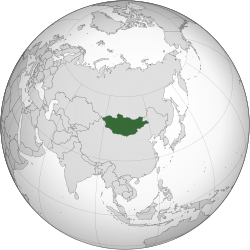Mongolia (pronounced /mɒŋˈɡoʊliə/; Mongolian: ![]() Монгол улс (help·info), literally Mongol country/nation,
Монгол улс (help·info), literally Mongol country/nation, ![]() ) is a landlocked country in East and Central Asia. It borders Russia to the north and the People's Republic of China to the south, east and west. Although Mongolia does not share a border with Kazakhstan, its western-most point is only 24 miles (38 km) from Kazakhstan's eastern tip. Ulan Bator, the capital and largest city, is home to about 38% of the population. Mongolia's political system is a parliamentary republic.
) is a landlocked country in East and Central Asia. It borders Russia to the north and the People's Republic of China to the south, east and west. Although Mongolia does not share a border with Kazakhstan, its western-most point is only 24 miles (38 km) from Kazakhstan's eastern tip. Ulan Bator, the capital and largest city, is home to about 38% of the population. Mongolia's political system is a parliamentary republic.
The area of what is now Mongolia has been ruled by various nomadic empires, including the Xiongnu, the Xianbei, the Rouran, the Gökturks, and others. The Mongol Empire was founded by Genghis Khan in 1206. After the collapse of the Yuan Dynasty, the Mongols returned to their earlier patterns. In the 16th and 17th centuries, Mongolia came under the influence of Tibetan Buddhism. At the end of the 17th century, most of Mongolia had been incorporated into the area ruled by the Qing Dynasty. During the collapse of the Qing Dynasty in 1911, Mongolia declared independence, but had to struggle until 1921 to firmly establish de-facto independence, and until 1945 to gain international recognition. As a consequence, it came under strong Russian and Soviet influence: In 1924, the Mongolian People's Republic was declared, and Mongolian politics began to follow the same patterns as Soviet politics of the time. After the breakdown of communist regimes in Eastern Europe in late 1989, Mongolia saw its own Democratic Revolution in early 1990, which led to a multi-party system, a new constitution in 1992, and the - rather rough - transition to a market economy.
At 1,564,116 square kilometres, Mongolia is the nineteenth largest and the most sparsely populated independent country in the world, with a population of around 2.9 million people. It is also the world's second-largest landlocked country after Kazakhstan. The country contains very little arable land, as much of its area is covered by steppes, with mountains to the north and west and the Gobi Desert to the south. Approximately 30% of the country's 2.9 million people are nomadic or semi-nomadic. The predominant religion in Mongolia is Tibetan Buddhism, and the majority of the state's citizens are of the Mongol ethnicity, though Kazakhs, Tuvans and other minorities also live in the country, especially in the west. About 20% of the population live off less than US$ 1.25 a day.
Contents
- 1 History
- 2 Government and politics
- 3 Foreign relations and military
- 4 Geography and climate
- 5 Administrative divisions
- 6 Economy
- 7 Transportation
- 8 Demographics
- 9 Culture
- 10 See also
- 11 References
- 12 Further reading
- 13 External links
| ||||||
| Anthem: "Монгол улсын төрийн дуулал" National anthem of Mongolia | ||||||
| Capital (and largest city) | Ulan Bator 47°55′N 106°53′E / 47.917°N 106.883°E | |||||
| Official languages | Mongolian | |||||
| Demonym | Mongolian[1] | |||||
| Government | Parliamentary republic | |||||
| - | President | Tsakhiagiin Elbegdorj | ||||
| - | Prime Minister | Sanjaagiin Bayar | ||||
| Formation | ||||||
| - | Formation of the Mongol Empire | 1206 | ||||
| - | Independence declared (from Qing Dynasty) | December 29, 1911 | ||||
| Area | ||||||
| - | Total | 1,564,115.75 km2 (19th) 603,909 sq mi | ||||
| - | Water (%) | 0.43[2] | ||||
| Population | ||||||
| - | July 2007 estimate | 2,951,786[3] (139th) | ||||
| - | 2000 census | 2,407,500[4] | ||||
| - | Density | 1.7/km2 (235th) 4.4/sq mi | ||||
| GDP (PPP) | 2008 estimate | |||||
| - | Total | $9.399 billion[5] | ||||
| - | Per capita | $3,541[5] | ||||
| GDP (nominal) | 2008 estimate | |||||
| - | Total | $5.258 billion[5] | ||||
| - | Per capita | $1,981[5] | ||||
| Gini (2002) | 32.8 (medium) | |||||
| HDI (2007) | ▲ 0.700 (medium) (114th) | |||||
| Currency | Tögrög (MNT) | |||||
| Time zone | (UTC+7 to +8[6][7]) | |||||
| Date formats | yyyy.mm.dd (CE) | |||||
| Drives on the | right | |||||
| Internet TLD | .mn | |||||
| Calling code | 976 | |||||













No comments:
Post a Comment